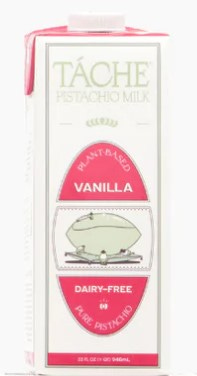Most people buy plant milks for either sustainability or dietary reasons. If it is for dietary reasons, looking for a brand that has clean ingredients, little added sugar, while still tasting good is essential. If it is for sustainability reasons, research needs to be done to know whether the plant (or nut) meets your own personal sustainability standards. Tache produces plant milks that are based in pistachios. They have several different versions—Plain Unsweetened, Original (Sweetened), and their newest products—Vanilla Unsweetened and Vanilla (sweetened). Today, we will be looking at the Vanilla (sweetened) to see how it compares to other plant milks.
Filtered Water—Self explanatory
Pistachios—Pistachios are high in Vitamin B6 and contain good amounts of Vitamin B1, phosphorous, magnesium, and potassium. It also has a high amount of unsaturated (good) fats. Pistachios are grown in arid climates like the Central Valley in California, Arizona, and New Mexico. Although they have less of a water footprint than almonds, pistachios are still a very water intensive crop (it takes 85 gallons of water to grow 49 kernels--a 1 ounce serving. One serving of this product has 4.9 pistachios.)
Cane Sugar—Cane sugar is slightly less refined than regular sugar. It is extracted from the sugar cane and its slightly tan color is due to the presence of molasses. It is a source of added sugar. It is interesting to note that this is not organic (most cane sugars are organic).
Gum Acacia—Gum acacia smooths out the texture of the product, adds thickness and mouthfeel, and helps keep the product homogeneous. It also adds to the dietary fiber claim. However, since the dietary fiber claim is 1 gram, there is not a lot of this ingredient.
Gellan Gum—Gellan gum is produced commercially by fermenting sugar with a bacterium. It is also naturally grown on lily pads. At low levels, it helps keep the product from separating out.
Natural Flavors—This can include any naturally derived flavors from vanilla beans and/or other natural sources (plant materials, fruits, vegetables, spices). Regulations do not have to say where the natural flavors are from or even if they are from vanilla beans.
Dipotassium Phosphate—Dipotassium phosphate is an electrolyte. At low levels (which is what is occurring here), it functions as an electrolyte and to make sure that the product tastes the same over its shelf life. Note: all electrolytes should be consumed in moderate (not high) amounts.
Sea Salt—Sea salt contains 2% trace minerals that table salt does not have. Trace minerals are anything from zinc, magnesium, manganese, etc. all of which contribute to healthy functioning. Sea salt is also added to help bring out the vanilla flavor and mask some of the bitter pistachio flavors.
Final Evaluation
Ingredient Quality: A. This product is vegan, non-GMO Project Verified, and gluten-free.
Ingredient Clarity: A. All ingredients are clean and makes sense to the product.
Functional Benefit: B-. Although pistachios are nutritious, they are also very water intensive and are grown in areas that are drought-ridden. They are not as water-intensive as almonds, but if you want to buy a plant-based milk for sustainability reasons, there are plenty of other choices that support more sustainable crops.
Nutritional Value: B+. 6 grams of added sugar is comparable to other plant milk brands. However, added sugar is still added sugar. (Note that Tache also has an unsweetened vanilla product that does not contain any added sugar.)
Overall Score: B+. This product has clean ingredients and good claims, including being non-GMO project verified. Pistachios are high in potassium and other trace minerals and contain heart healthy fats. However, they are a water intensive crop grown in areas that are drought-ridden, which makes them questionably sustainable. There are plenty of other plant milks that can boast better sustainability claims. (It is interesting to note that the website calls out the small water footprint. Compared to almonds, almost every plant milk has a small water footprint!!)
Why do you buy plant milks? Is it for sustainability reasons or for other reasons? Let us know!
This product was evaluated purely based upon the perspective of a food scientist. The writer’s opinions are purely her own without influence or affiliation with the brand.




